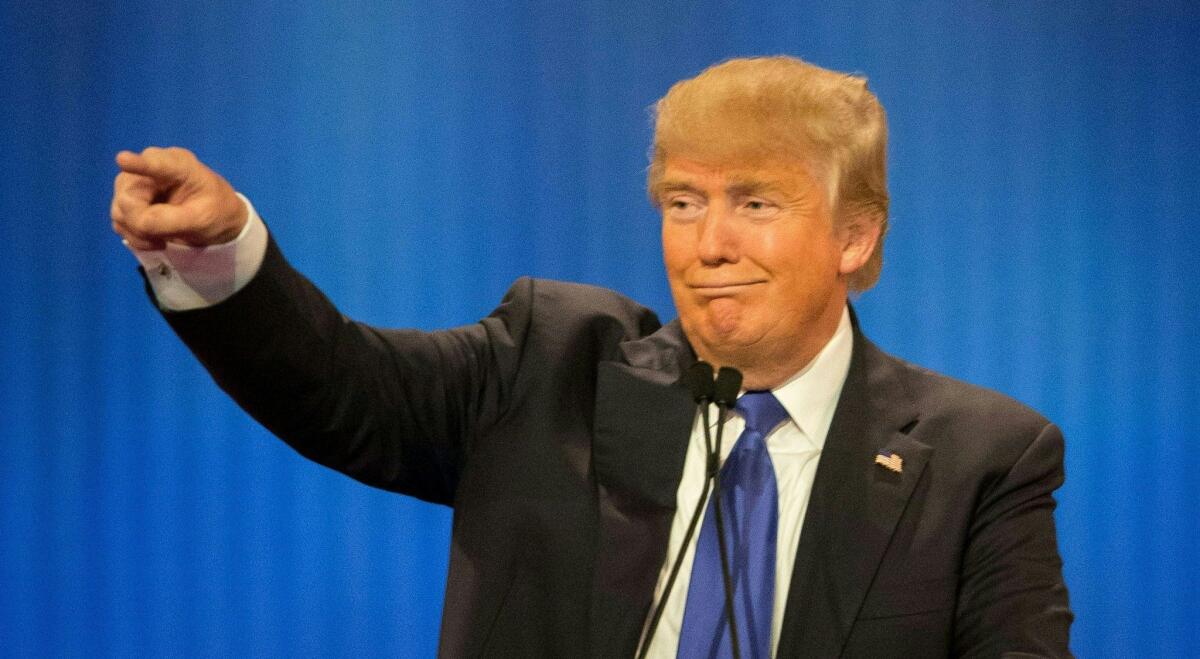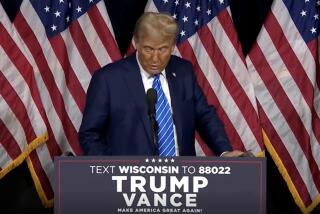Commentary: Who could make this up? Why ‘The Trump Show’ is such a crazy-making script

- Share via
Narrative is humanity’s defense against the randomness of existence. We tell ourselves stories not to sink into chaos. Would-be authors of our time on Earth, we impose order onto our lives by drawing connections between events, underscoring thematic trends, fleshing out character psychology and shoehorning our years into plots with beginnings, middles and ends.
Packaging experience in this way doesn’t simply protect us from the possibility of meaninglessness. It helps foster the illusion that the future is predictable and that, whatever else might happen to us, anarchy will not mow us down.
Among the many catastrophes we can lay at Donald Trump’s feet, his long-shot presidency has plunged the nation into a narrative crisis. The tale of his four years in office cannot be contained within discrete genres. He lacks the dignified gravitas required of tragedy. And as commander in chief, he possesses too much lethal power to be laughed off as a comic buffoon.
Trump’s political drama is unlike anything we’ve seen before. No one can figure out the rules of the script. Just when you think the action is building to a climax — the Mueller report, impeachment, more than 200,000 dead from a pandemic — a different calamity usurps our attention.
The latest development — positive COVID-19 test results for the president and first lady — comes on the heels of a week of bombshells. On Sunday, the New York Times, having obtained more than two decades of Trump’s secret tax-return data, revealed that the billionaire emperor has no clothes.
This puncturing of the successful businessman myth that Trump rode to the White House came one day before Trump announced he had nominated Amy Coney Barrett to the Supreme Court to replace Ruth Bader Ginsburg, whose death Sept. 18 was said to have upended a presidential race that had already just been turned upside down when Trump refused to guarantee a peaceful transition of power.
The New York Times tax story was nearly all anyone could talk about until Tuesday when Trump and Joe Biden had their first presidential debate. Trump’s belligerent hijacking of the stage, a performance better suited to the professional wrestling ring than electoral politics, had pundits riffling through a stack of dumpster fire metaphors.
On Wednesday, the chattering class was preoccupied by the horrific realization that Trump at the debate had in fact directed the Proud Boys, a far-right group, to “stand by” in case he needs help in strong-arming an electoral victory. This explosive headline was still dominating on Thursday, even as tapes of Melania Trump emerged in which she’s heard bad-mouthing Christmas and complaining that the kids in detention centers at the border who are cruelly separated from their parents never had it so good.
But naturally the plot turned. In the evening, Hope Hicks, a senior aide who had been traveling with the president, was revealed to have tested positive for coronavirus. The president tweeted that the first lady and he would quarantine themselves as required. The media’s fried synapses sizzled into action. Speculation about Trump’s health and what COVID-19 might mean for a 74-year-old obese man with cardiac risk factors was rife across news channels not owned by Rupert Murdoch.
Remembering that it was only Oct. 1, I tweeted, “31 days of October surprises. Night one: Hope Hicks get Covid!” And then, for the sake of my mental health, I turned away from the news for 45 minutes. When I next peeked at my phone, I saw that my waggish tweet was already obsolete. A bigger October surprise had arrived: The president himself was infected.
Twitter erupted in a strange form of dramaturgical glee. Had a dramatic pattern finally solidified? Thoughts and prayer were dispatched from both ends of the political spectrum, but the shift in plot was making people giddy. For many this development marked what Shakespeare would have called a turning of the wheel, that moment in drama when a villain’s streak of luck runs out and the light of justice peeks out from behind pitch-black clouds.
The word “karma” was being bandied about on social media not so much in a spirit of schadenfreude as in relief that a traditional storytelling arc was at long last asserting itself. The bad guy has a habit of stealing the show, but if there’s no comeuppance, if the transgressor continues to get away with murder, exhaustion is inevitable. Reckonings can be postponed but only for so long.
But how could anyone be sure that we’re in the last act of a single play and not in a multipart epic? Or might this be a tragicomedy à la Chekhov, where a gun glimpsed early on is eventually used to settle a score but doesn’t actually hit its target? In this scenario, Trump, who expresses derision for public health safety measure like masks, is infected with the virus but only gets mildly ill and then uses his bully pulpit to espouse the notion that the pandemic has been a Democratic hoax designed to unseat him.
Nothing changes because we’re in a genre that is comfortable ending on a note of mournful irony. Yet political entities with nuclear arsenals at their disposal aren’t usually characters in Chekhovian plots. Their lives are too consequential. Best to leave the existential musing to those with nothing to do all day but ruminate on missed chances.
Television, the medium that launched Trump’s political trajectory and temporarily replenished his broken bank accounts, would seem to be a more obvious source of dramatic templates. The only problem is that his presidential series has been “jumping the shark” from Day 1. This hyperactive drama, with a cast that includes a brainy porn star, an unhinged ex-mayor, spoiled brat children and a rogues’ gallery of felons, would be considered too much by even Netflix’s freewheeling standards.
Realism, a dramatic style that coincided with the rise of middle-class audiences eager to see reflections of themselves onstage, has conditioned us to expect behavior to fall within reasonable norms. This is why Trump comes across as such an unrealistic character. Biden called him a “clown” at the debate, and whatever you might think of the former vice president’s flash of impatience, a circus would have been a more plausible context for Trump’s act.
The president was born for extremity, making it difficult to place him in the correct dramatic universe. I’ve looked to Shakespeare and Sophocles for answers. Among friends, I’ve traded comparisons with “The Sopranos.” Reality TV has been the default analogy.
But the truth is that we have been living the last four years on the metabolism of Twitter.
The state of alarm has been continual since Trump took office. Structural limits have proved to be as flimsy as his border wall. Anything can happen at any time. The only mode that can be discerned is accretion, a flooding of the zone so that nothing can be properly weighed or valued. With sensation mainlined into our veins through our phones and laptops, art has little chance of keeping pace.
Our attention spans are shattered. As soon as we learned that Trump has COVID-19, we were waiting for the other shoe to drop. Was this a ruse? Would he be incapacitated? What about Vice President Mike Pence and Biden and Coney Barrett’s confirmation? More, more, more, more, more. As exhausted as we are, we’re still hitting refresh. We’re addicted, but I think if Trump loses it will be because fewer Americans have the stamina for “The Donald Trump Show.” A sober Biden rerun is just what the rehab doctor ordered.
More to Read
The biggest entertainment stories
Get our big stories about Hollywood, film, television, music, arts, culture and more right in your inbox as soon as they publish.
You may occasionally receive promotional content from the Los Angeles Times.










